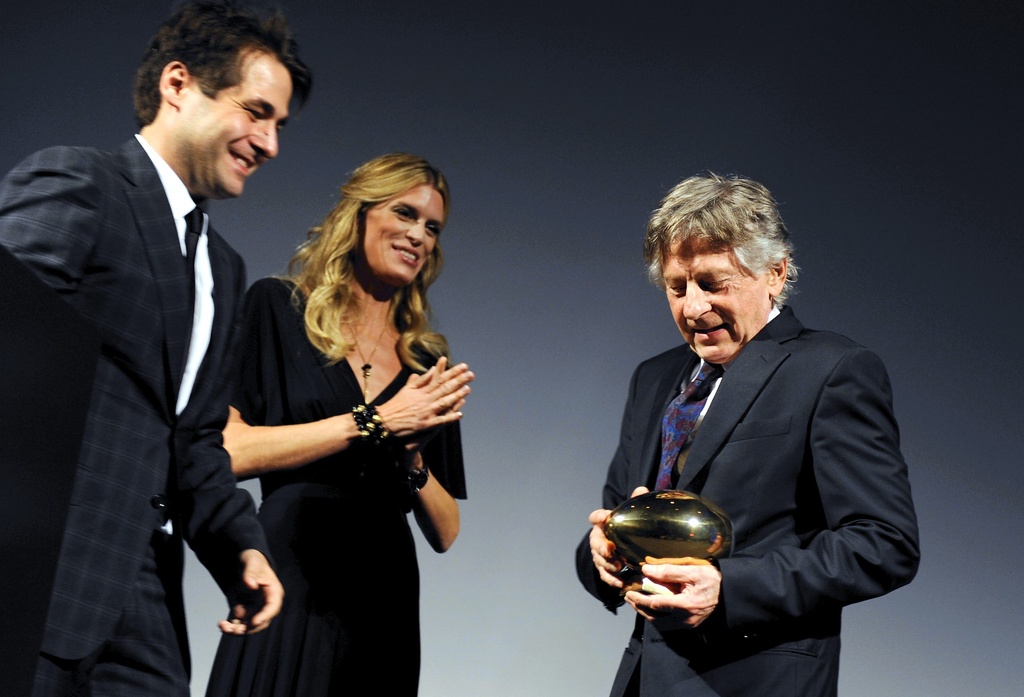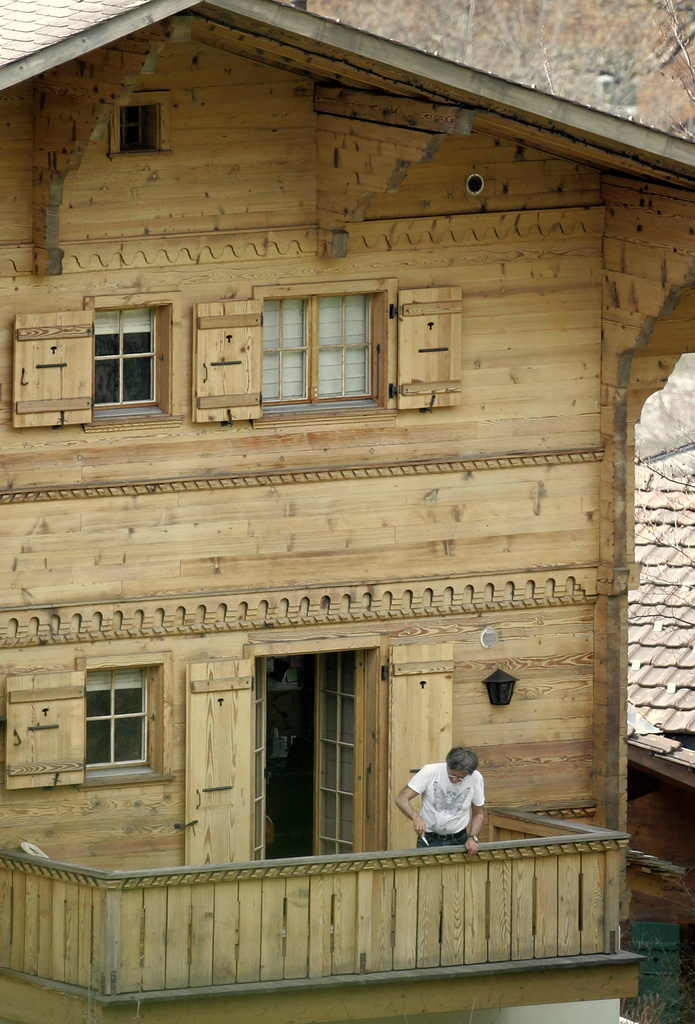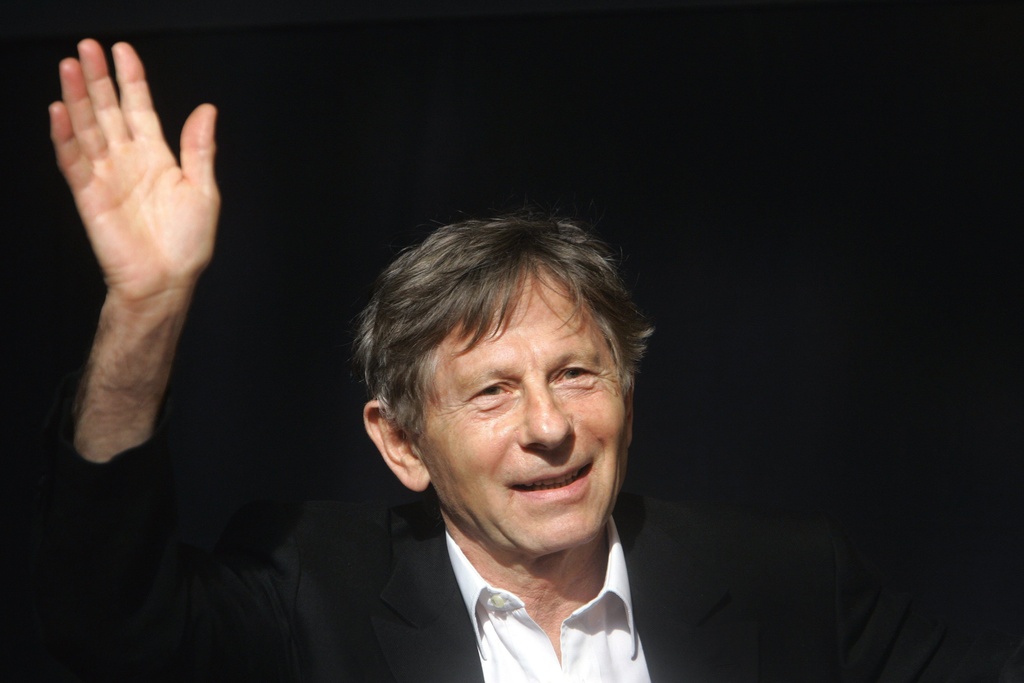Polanski finally makes it to Zurich festival

Film director Roman Polanski attended the Zurich Film Festival on Tuesday to accept the lifetime achievement award he was supposed to receive there two years ago.
In 2009 the Oscar-winning Franco-Polish filmmaker was arrested at Zurich airport en route to the ceremony in connection with a 1977 child rape case in the United States.
The move caused an international media and cinema world furore – and turned the spotlight on the film festival.
Polanski was later placed under house arrest in his chalet in the Swiss resort of Gstaad. He was freed the following July after the Swiss authorities decided not to extradite him to the US.
Now able to travel unhindered to Switzerland, Polanski, 78, arrived at the award ceremony in the Cinema Corso 1 in Zurich. Several hundred people stood to applaud him as he took his seat. He later came onto the stage.
“Friends, what can I can say? Better late than never,” he said. “Two years, day for day. Certain parts of it I would rather forget. But I’m happy to be here, because I know that it was not only a blow to me, to my family, but also to the festival itself,” he said. “It’s a very moving moment for me.”
Afterwards there was a screening of a world premiere, a full-length documentary called Roman Polanski: A Film Memoir.
Film memoir
It recounts Polanski’s Polish roots and experiences of the Second World War. The documentary by Laurent Bouzereau is based a long interview with Polanski by his friend and producer Andrew Braunsberg during his house arrest two years ago.
At a media conference on Wednesday, Braunsberg said that the documentary was aimed at showing “the Roman that I know”.
“Roman is a very polarising figure, he just is for many different reasons, and the story, if you don’t know him and you don’t see this film, you tend to get a very one-sided view. It’s a story that’s been playing over and over again.”
There were no new revelations in the documentary, although Polanski did admit near the end that the girl at the centre of the rape case was “a double victim: my victim and a victim of the press”.
Braunsberg told swissinfo.ch in response to a question that the plan was now to get the film “distributed and seen by as wide an audience as it will reach”.
Before the ceremony, Zurich Film Festival co-director Karl Spoerri had expressed delight that Polanski was coming.
Spoerri said he was not afraid of Polanski overshadowing the festival, which is in its seventh year.
“Of course people will be talking about him, but people will also be coming to see the films at the festival,” he told swissinfo.ch.
End to rumours
According to Christian Jungen, film critic for the Zurich-based NZZ am Sonntag newspaper, it was actually Polanski himself who wrote an email to the festival about collecting the prize, initially in Paris, where he lives.
“This somehow puts an end to rumours that he was angry with Switzerland, angry with the Zurich Film Festival,” Jungen told swissinfo.ch.
The director wasn’t able to attend the premiere of his latest film, Carnage – which stars Kate Winslet, Jodie Foster, Christoph Waltz and John C Reilly – at the Venice Film Festival on September 1 because his movements are restricted by an Interpol warrant effective in 188 countries. The 78-year-old can only travel between Poland, France and Switzerland, said Jungen.
Polanski, whose films include Chinatown, Rosemary’s Baby and the Oscar-winning The Pianist, pleaded guilty in Los Angeles to having unlawful sexual intercourse with a 13-year-old girl in 1977.
But he fled the US on the eve of his 1978 sentencing because he believed a judge might put him in jail for 50 years. He has lived as a fugitive in Europe ever since.
After his arrest, Polanski spent two months in a Swiss jail before the house arrest in his chalet.
In July 2010 Swiss authorities said they would not extradite him, because of potential technical faults in the US request – a move which US officials described as disappointing.
Figure of interest
Jungen said that Polanski had used his Swiss detention to work on Carnage, which received good reviews at Venice.
“He was in constant phone contact with his producers and he finished the script. I had the chance to talk to Waltz and Reilly at the Venice Film Festival and they told me that during this time, they were having phone calls meetings with Polanski.”
Polanski’s standing in the film world was revealed by the global support he gained from the industry, including from fellow directors Martin Scorsese and Woody Allen, at the time of his arrest.
Jungen said that over time Polanski had progressed from a rebel who made scary films, such as Rosemary’s Baby, to a more classic filmmaker.
Scandals or not, the director remains a figure of interest. “It’s also because in Polanski’s oeuvre the line between the private and what he does in film is always blurring,” said Jungen, adding that many films dealt with being locked in and the need to break out.
“The Pianist was the most obvious as it is a biographic film where he talks about his youth in the Warsaw ghetto as a Jew fleeing the Nazis. Much of the interest comes from this autobiographical aspect which you can find in every one of his films.”
The 7th Zurich Film Festival started on September 22 and runs until October 2.
Apart from Polanski, other famous names attending are Jeremy Irons, Sean Penn (who will receive Golden Icon Award for his lifetime achievement as an actor, director and producer), Laurence Fishburne (jury head) and Emma Stone.
There are 96 films and the line-up includes: Shame, A Dangerous Method, Melancholia and George Clooney’s Ides of March. The opening film was Steven Soderbergh’s Contagion and the festival will end with The Help.
The international competition will see young filmmakers competing for the Golden Eye – the festival’s main award.
1977: Roman Polanski, 43, has sexual intercourse with Samantha Geimer, 13.
At trial Polanski pleads not guilty to rape, then in August changes plea to guilty of statutory rape; sentenced to 3 months jail for psychiatric tests.
1978: Flees to Paris, judge then refuses to give verdict in absentia.
1994: Prosecutor refuses to dismiss case unless Polanski appears in court. Polanski had already ended the civil case by paying Geimer $225,000.
2008: Polanski lawyers call for case to be dropped over original trial’s unfairness.
Sep 26, 2009: Polanski arrested on arrival at Zurich airport.
Sep 28: Appeals against extradition request; receives wide support from film world and French politicians and intellectuals.
Oct 6: Federal Justice Office refuses to release him.
Oct 23: US formally requests extradition.
Nov 25: Swiss court agrees to house arrest in Gstaad on bail of SFr4.5 million.
Dec 4: Polanski moves to Gstaad chalet, wearing electronic surveillance bracelet.
Jan 2010: Los Angeles court rejects request for trial in absentia, a decision confirmed by appeal court in April.
July 12: Swiss justice minister announces rejection of extradition request.
(With input from Stefania Summermatter)

In compliance with the JTI standards
More: SWI swissinfo.ch certified by the Journalism Trust Initiative














You can find an overview of ongoing debates with our journalists here . Please join us!
If you want to start a conversation about a topic raised in this article or want to report factual errors, email us at english@swissinfo.ch.